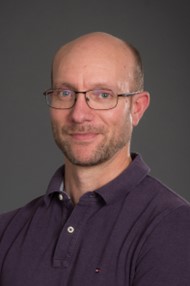Dr Thomas Schalch
Supervisor Details
Research Interests
We focus on discovering structural and biochemical principles that operate to organize and programme genomes is the major goal of research in my laboratory. Many of these processes are tightly linked to cancer and are of great interest for the development of therapeutic interventions. The following projects are currently actively pursued in my laboratory:
The structure of the chromatin fibre in the cell nucleus and its relationship to gene regulation remains poorly understood. (BBSRC grant BB/R016275/1).
Ubiquitination is not only critical for protein degradation but also for chromatin signalling where it orchestrates downstream histone modifications on transcribed genes. Our work on the histone H2B ubiquitin ligase complex aims to reveal the mechanism driving the protection of active genes by H2B ubiquitination from heterochromatin invasion. (BBSRC grant BB/S018549/1).
Our recent work on the regulation of histone H3 methyltransferase Clr4 established that ubiquitination also controls heterochromatin formation. We are very keen to investigate the molecular mechanisms that control this key enzyme.
Research group activity
Chromatin structure and function
Genes, encoded in very long and fine strings of DNA, determine how organisms develop and function. In eukaryotes, the DNA is confined to the nucleus where it is wrapped into chromatin, which consists of many different proteins that package the genomic material. Many essential cellular processes like transcription, repair and duplication of the genome happen in the context of chromatin. Like a city, the nucleus is divided into different neighbourhoods, with quiet zones called heterochromatin, and centres of bustling activity called euchromatin. As organisms develop and cells assume more and more specialised roles in the body, each cell arranges its chromatin neighbourhoods in a way that supports the gene expression program corresponding to the cell’s function in the organism. Dysfunction of cellular programs and loss of genome organisation is at the heart of diseases ranging from viral infections to cancer and plays an important role in ageing.
In my group, we study chromatin structure and the macromolecular machines that are crucial for establishing and maintaining genomic neighbourhoods. We are particularly interested in understanding how chromatin is organised in 3D and how the heterochromatin machinery silences specific regions of the genome.
The basic repeating unit of chromatin is the nucleosome consisting of ~150 base pairs of DNA and four histone core proteins as well as a linker histone protein. Previous and current studies have shown that nucleosomes interact with each other to form higher-order chromatin structures, but where and how these interactions exactly occur on live genomes, and what their role is with respect to genome function remains poorly understood. We are developing methods to get at these questions using both in vitro model systems as well as the fission yeast model organism S. pombe, which is an excellent model for studying the formation and function of heterochromatin. Furthermore, using X-ray crystallography in conjunction with genetic and biochemical experiments we are studying the mechanistic aspects of large macromolecular machines that establish heterochromatin. Recently, we have contributed to understanding the nucleosome remodelling and deacetylation complex SHREC. This molecular assembly of proteins is responsible for silencing genes that are found in heterochromatic regions and we have established the molecular details of how the complex ties together its subunits. This understanding allows us now to focus on the question of how chromatin recruits and regulates SHREC in order to guide its gene silencing activity.
Scientific Inspiration
I am fascinated by the scientists who started the field of molecular biology including Sidney Brenner, Francis Crick, Jaques Monod and François Jacob who united biochemistry and genetics with brilliant experiments and thinking.
Research Groups
MIBTP Project Details
Primary supervisor for:
